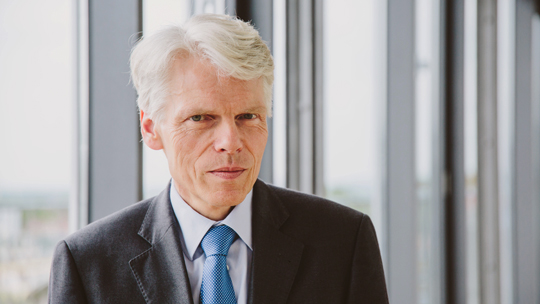“An Alumnus in the University Council and the Stifterverband”
Freiburg, Jul 12, 2017
The University of Freiburg has a lot planned for the next few years. Work on the next strategy and development plan for 2019 to 2023 has just gotten underway, and the Excellence Strategy and Promoting Young Researchers Program competitions are in full swing. What are the most relevant topics, and how are universities and higher education policies dealing with them? What issues are currently being addressed by the University of Freiburg? The lecture series “Über Forschung, Lehre und Karrierewege – Zukunftsperspektiven der Universität Freiburg” (On Research, Teaching, and Career Paths: Future Prospects of the University of Freiburg) is focusing on these and other questions. Prof. Dr. Dr. Andreas Barner will hold a lecture on July 20, 2017 , as part of this series. He is the chair of the University of Freiburg’s University Council, president of the Stifterverband für die Deutsche Wissenschaft (an organization that promotes and supports science and technical research in higher education), and a member of the shareholders' committee at Boehringer Ingelheim. Nicolas Scherger talked to him in advance.

Establishing the Faculty of Engineering, being part of local networks, and providing more information and a greater offering for students – Andreas Barner sees all this as proof that the University of Freiburg has changed for the better since he was a student. Photo: Sandra Meyndt
Prof. Dr. Dr. Barner, the title of your lecture is “Ein Alumnus im Universitätsrat und im Stifterverband: Ein dreifacher Blick auf die Uni Freiburg” (An Alumnus in the University Council and the Stifterverband: Looking at the University of Freiburg from Three Angles). Which perspective do you prefer?
Alumnus, University Council, Stifterverband, in that order. You care about the university you studied at, and you have a strong sense of sympathy toward it. At the same time, I’m impressed by how the University of Freiburg has changed since I was a student, and I’m pleased that many things have improved. As the chair of the University Council, I'm happy to see how the different bodies are working together with the rector and vice-rectors. From the point of view of the Stifterverband, I know that we're able to plan more reliably in Baden-Württemberg compared to other states because the state government has passed clear resolutions. We also have a certain amount of autonomy not only on paper, but also in actual practice.
What noticeable form does this take?
The University of Freiburg has always been strong in traditional disciplines, like the humanities, natural sciences, law, medicine, and so forth. Then when the Faculty of Engineering – with the fields of microsystems engineering, computer science, and sustainable systems engineering – was established in the 1990s, it not only added completely new components; it also reached out to other disciplines as well. The University also became more connected in the area through partnerships with Strasbourg, Mulhouse, Basel and Karlsruhe via the European Campus and by cooperating with the Fraunhofer-Gesellschaft. Communication has also expanded. The information available on the Internet and the way new students are welcomed, what they are offered, is all lightyears away from when I was a student.
What feedback do you get regarding how the University is viewed internally and externally, and how do these two points of view compare?
The University is often perceived more critically from the inside. I hear more comments about what needs to be improved and what isn't working so well. Naturally, that’s also because I'm the chair of the University Council, and people probably ask me things with the hope that I’ll take the inquiry to the right person or propose improvements. When I’m outside the University, I notice it has a positive image. In Freiburg and especially beyond, it’s regarded as one of the best universities in Germany.
What do you think are the University of Freiburg’s strengths, and what should definitely be improved in the next few years?
I think one of the University’s main strengths is its interdisciplinary cooperation – for example, between medicine, the natural sciences, and engineering, or amongst the humanities, or in the Freiburg Institute for Advanced Studies. The University has also traditionally had a very good publishing record that ranks highly in Germany and abroad. As to what could be improved, the sports medicine issue has been a difficult one and has occupied the University for quite a while. But it’s very good that the University has dealt with its doping past, and when a little more time has passed, it will be even more obvious just how committed the University is to its new direction and to transparency. We can move past this issue as long as we continue to remember that things like these can always happen and that we need to be watchful and make sure that it doesn’t happen again in the future.
If you merge your three positions into one overall view, what do you see?
The University of Freiburg is a strong university that puts original, smart ideas into practice. One of these is the Freiburg Institute for Advanced Studies, which has continued to flourish in form and content, as well as the University College Freiburg. I can recommend both of these to students. I would love to be a student again at the University of Freiburg.
You can watch videos of the first lecture “Wettbewerb um Exzellenz - Was soll das? Ein kritischer Diskussionsabend à la carte” (Excellence Strategy Competition: What Is It Good For? An Evening of Critical Discussions” in the series “Über Forschung, Lehre und Karrierewege - Zukunftsperspektiven der Universität Freiburg” (On Research, Teaching, and Career Paths: Future Prospects of the University of Freiburg) at:
http://www.exzellenz.uni-freiburg.de/de/veranstaltungen/vergangene-veranstaltungen
The University of Freiburg Excellence Portal
http://www.exzellenz.uni-freiburg.de/en

